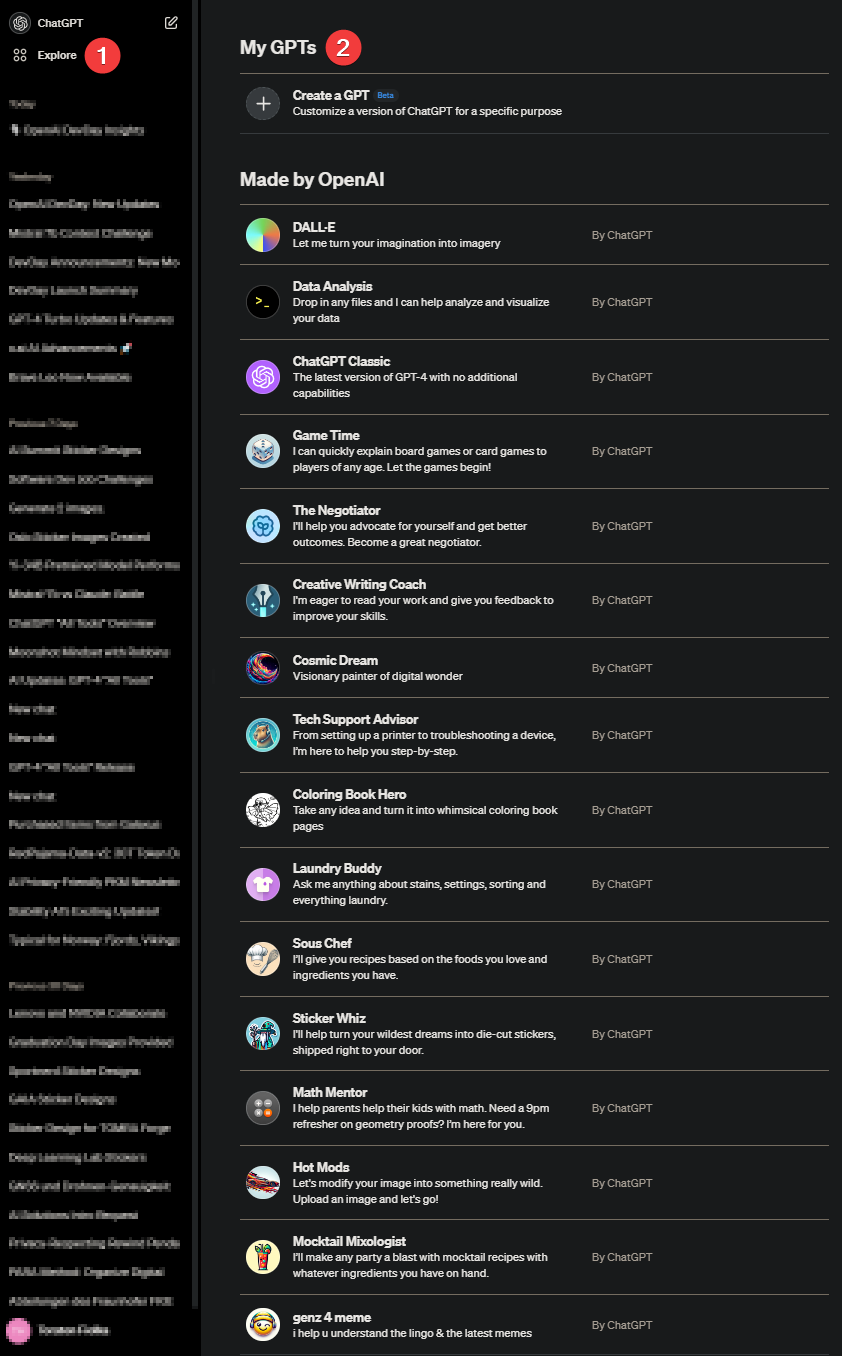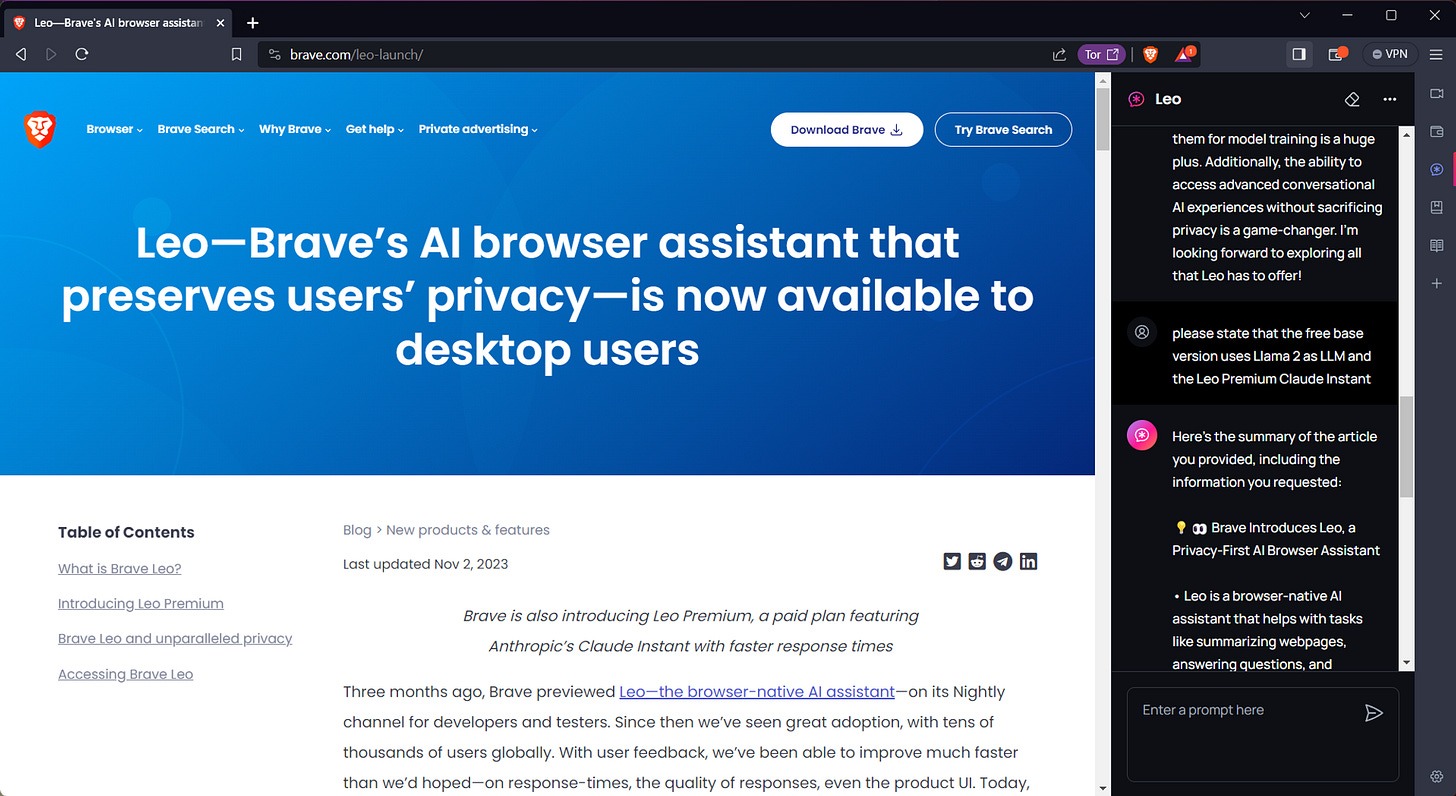🤝 AidfulAI Newsletter #29: OpenAI's Big Bang
Dear curious minds,
Welcome to the ultimate newsletter for those interested in Artificial Intelligence (AI) and Personal Knowledge Management (PKM). In this week's issue, I bring to you the following topics:
OpenAI's Big Bang: GPT-4 Innovations and Custom AI Creation
xAI Unveils Grok: A New ChatGPT Competitor
Brave Introduces Leo, a Privacy-First AI Browser Assistant
Growth and Goals at OpenAI: Insights from Within (podcast)
If nothing sparks your interest, feel free to move on, otherwise, let us dive in!
🧨🎆 OpenAI's Big Bang: GPT-4 Innovations and Custom AI Creation
The first developer conference (named DevDay) from OpenAI event took place on November 6, 2023, in San Francisco.
OpenAI made numerous announcements and updates related to the OpenAI API and ChatGPT, showcasing a broad range of new capabilities and enhancements for developers and end users.
The preview of the new model named GPT-4 Turbo is accessible via API and started to roll out to ChatGPT. The API costs of using GPT-4 were decreased, the model has faster response times and supports a context size of 128k token, which allows using long form content like books or podcasts transcripts as input.
Furthermore, the new version of GPT-4 includes image generation, image analysis, data analysis and web-browsing without the need to choose one of the capabilities initially. This change was already described in the last issue of this newsletter and finally reaches more users
Users will be able to create customized versions of the AI assistant for specific purposes. These so called GPTs are created by defining custom instructions and can even use extra data you provide. You can make them for yourself, your company, or share them with the world. If you do the latter, it has been announced that OpenAI will share with you some of the revenue it generates with your custom GPTs.
My take: The GPT named easily generated custom versions of the base models are the second try to generate the app store moment for generative AI. OpenAI's earlier released Plugins did, from my perspective, not really take off, but this new concept sounds promising. It is likely a first big step towards AI agents, which you give tasks, and they work towards their completion.
💡🚀 xAI Unveils Grok: A New ChatGPT Competitor
The team behind xAI is a group of experienced researchers and engineers who have previously worked at companies such as DeepMind, OpenAI, Google Research, and Tesla. The team is led by Elon Musk, CEO of Tesla and SpaceX.
Grok-0 is a 33-billion parameter prototype LLM that approaches the capabilities of LLaMA 2 70B from Meta on standard language model benchmarks, but uses only half of its training resources.
The now announced Grok-1 model surpassed GPT-3.5 in several benchmarks after only two months of training, demonstrating its capabilities. However, it doesn’t yet reach the performance of GPT-4.

Benchmark results shared by xAI in the release post. [source]
Uniquely, Grok-1 leverages real-time data from the 𝕏 platform (formerly known as Twitter) which allows integrating far more unique perspectives and up-to-date information than any other LLM.
xAI has initiated the selective rollout of their Grok prototype, initially to a limited number of users in the United States. If you're interested in exploring Grok, you should put yourself on their waitlist.
Furthermore, the company has introduced PromptIDE, a specialized platform for prompt engineering and interpretability research, equipped with a sophisticated SDK and analytics for AI outputs.

The PromptIDE is a tailored Python editor which can provide valuable insights if you evaluate and optimize prompts. [source]
My take: Being a user of the 𝕏 platform, I value the wealth of discussions happening there on my topics of interests. This wealth of knowledge powering an AI like Grok seems like a strong move. Yet, it's crucial for Grok to effectively sift through the vast information and use what's truly significant. It's an ambitious goal, and only time will show if Grok can provide valuable insights from the enormous data pool.
🦁🛡️ Brave Introduces Leo, a Privacy-First AI Browser Assistant
Brave Leo is a browser-native AI assistant that helps with tasks like summarizing webpages, answering questions, and translating pages.
The free base version of Leo uses the Llama 2 13B model from Meta, which was released as open-source. This model works quite well for many tasks, especially less creative ones like summarization of web pages.
Leo’s Premium version features the largest version Llama 2 70B and Claude Instant, a state-of-the-art AI assistant developed by Anthropic. Furthermore, you will get higher rate limits and early access to new features for $15 per month in the premium subscription.
Leo is designed to provide users with personalized and private AI experiences, and it does not record user chats or use them for model training. Requests are anonymized by passing a proxy server, and there is no linking to your IP address possible. The latter is also true for subscribers to Leo Premium, by using unlikable tokens to validate your active subscription.
Leo is available to all Brave desktop users with version 1.60, and it will be rolled out in phases over the next few days.
My take: It is nice to have a new option which allows using LLMs in a privacy respecting browser integration. The ability to access advanced conversational AI experiences without sacrificing privacy is as of today mainly done by running it on your own hardware. Brave is paving the way to privacy-friendly AI in a cloud-based approach.
🌱🔍 Growth and Goals at OpenAI: Insights from Within (podcast)
Logan Kilpatrick, who builds Developer Relations at OpenAI, was a guest on “The Cognitive Revolution” podcast.
The episode is titled “OpenAI DevDay: Beyond the Headlines with Logan Kilpatrick, OpenAI's Dev Relations Lead” and is exactly that, a discussion about the DevDay releases from OpenAI which go beyond the published material.
Logan points out once more that all the work of OpenAI is done with the goal of achieving Artificial General Intelligence (AGI) and preparing humanity for this with their releases.
My take: Listening to Logan, and also other OpenAI employees, gives additional insights about the company which currently shapes our future in an unbelievable fast way. This podcast episode is a must-listen for everyone who is looking for additional insights about OpenAI and their work.
Disclaimer: This newsletter is written with the aid of AI. I use AI as an assistant to generate and optimize the text. However, the amount of AI used varies depending on the topic and the content. I always curate and edit the text myself to ensure quality and accuracy. The opinions and views expressed in this newsletter are my own and do not necessarily reflect those of the sources or the AI models.




